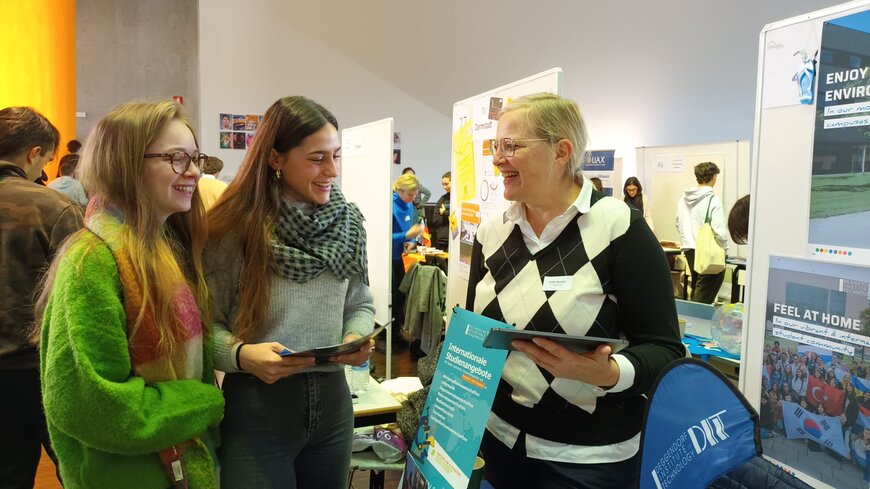
A hero: DIT joins the European University Network
Member of transnational alliance of higher education institutions since January
14.1.2025 | DIT Public Relations
Since 1 January, Deggendorf Institute of Technology (DIT) has been a true hero. Or one of 13 German HEROES, to be more precise. Though not the kind of "heroes" typically associated with the term; here, the acronym stands for "Higher Education for Resilience-Oriented and Empowered Societies". This is a transnational alliance of higher education institutions focusing on promoting the talents of a new generation of EU citizens. With the perhaps heroic goal of strengthening the regional resilience of people, companies and nature.
Ulrike Sauckel, Head of Division Internationalisation at DIT, is very proud to have brought Deggendorf Institute of Technology into this select fold. "The 1.9 million euros in total funding will allow us to get a lot of things done," hopes Sauckel, a DIT employee with vast experience in international university collaborations, adding: "It's about making the university, the teaching staff and the students fit for the future. For a VUCA world, a world shaped by volatility, uncertainty, complexity and ambiguity." It can even be a transformational process for the university and the region alike, she continues. "As regional networking is the focus of European Uni, the region will also benefit from the university's programmes," Sauckel is certain. These programmes are all the result of close cooperation with local stakeholders such as the city, schools, regional development and, of course, also with companies.
By way of example, new, contemporary teaching formats, such as challenge-based learning, will be a focus at DIT. This will be organised in cooperation with companies, but also with other institutions. "Such creative approaches will enable the necessary future skills to be developed and will bring new impetus to teaching at DIT," says Sauckel, adding that other programmes are intended to create inclusion so that the acquisition of intercultural skills no longer depends solely on the size of parents' wallets.
During the funding phase, DIT will be responsible for creating and maintaining the necessary ecosystem, i.e. for all stakeholder groups in and around a university: from pupils to alumni, from companies to environmental protection organisations. Programmes such as HEROESfriends, HEROESalumni, but also the Student Council or the International Advisory Board will be coordinated by the university.
With the "European University Networks (EUN) – National Initiative" programme, the German Academic Exchange Service (DAAD) is lending its support to the EU's "European Universities" initiative. Since the beginning of the year, 13 German universities have been supported in the current and final fifth funding round. They will receive around eight million euros from the Federal Ministry of Education and Research (BMBF) over the next four years in addition to the EU funding. DIT is included in this round.
The European Universities are cross-border university networks that jointly develop teaching and learning formats, new forms of cooperation in education, research and technology transfer and strive for close cooperation with society. They are the brainchild of French President Emanuel Macron and are part of the European Union's Erasmus+ programme.
In the national support programme, the DAAD assists the German universities selected by the EU in setting up European university networks. To this end, the DAAD promotes networking between the universities, helps to reduce bureaucratic hurdles and ensures greater visibility for German universities within the European networks.
The fifth funding round of the national accompanying programme started at the beginning of January 2025. Aside from Deggendorf Institute of Technology, the following German universities will receive up to 600,000 euros in addition to the EU funding over the next four years:
- Bauhaus-Universität Weimar
- Europa-Universität Flensburg
- FernUniversität Hagen
- HTW Berlin University of Applied Sciences
- Heilbronn University of Applied Sciences
- Offenburg University of Applied Sciences
- OTH Regensburg
- TH Köln – University of Applied Sciences
- Chemnitz University of Technology
- Technische Universität Ilmenau
- Technical University of Applied Sciences Würzburg-Schweinfurt
- University of Greifswald
Background European Universities
The European Universities initiative aims to bring Europe's universities much closer together in terms of teaching, research, transfer and innovation. At its core is the vision of a cross-border university. The means to achieving this are especially to involve developing joint study and research programmes, offering cross-campus programmes and the engagement of teachers, researchers and students in intensive dialogue.
Following two pilot calls for proposals, the EU selected the European universities over three funding rounds in 2022, 2023 and 2024. A total of 64 alliances spanning more than 560 participating universities from 35 countries have been established. 66 German universities are represented in a total of 58 alliances. Sustainable funding is currently being negotiated at EU level.
National support programme
Alongside the EU, the DAAD has been supporting German universities on their way to becoming European universities through a national support programme funded by the Federal Ministry of Education and Research since 2020. The programme currently supports 63 German universities that have received prior funding approval from the EU. A total budget of some 39 million euros has been allocated to the national support programme for the years 2024 to2027.
Bild (private): Travelling internationally for almost 20 years: Ulrike Sauckel (right) of Deggendorf Institute of Technology speaking with students at a congress.